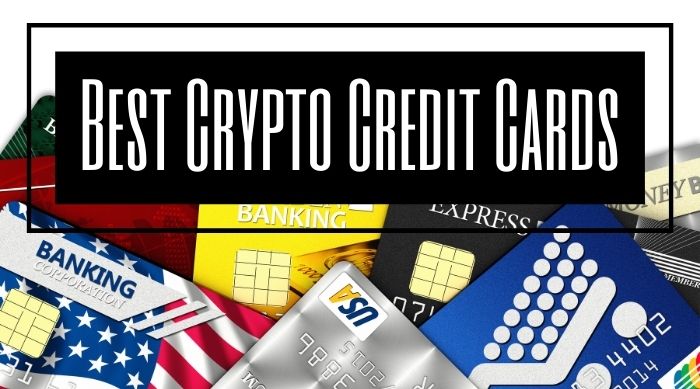Which cards are the best crypto credit cards? If you are looking for a credit card that allows you to pay for goods and services using crypto, you may be searching for a long time. But if you seek a card that offers user rewards or loyalty programs with an option to be paid in crypto there are multiple options to choose from.

The key is to find a card with the right balance of rewards, fees, and ease of use. What good are crypto rewards if you are nickeled and dimed to death with transaction fees, high APRs, or other drawbacks? It pays to shop around for the right crypto credit card, and the best way to do that is to compare offers side by side.
What follows is a comparison of different crypto credit card options; perks and rewards programs change frequently. The information below is current at press time but your experience may vary depending on changes in federal law, lender standards, or other variables. What follows is not tax or investment advice.
Best Crypto Credit Card For Welcome Bonuses: BlockFi
The BlockFi Rewards Visa Signature Card offers 3.5% back and up to $100 in cryptocurrency in the first three months of your new account. This card has also offered a no-annual-fee option and has a soft credit check pre-approval option.
The crypto rewards program for the BlockFi card includes cash back in crypto for purchases, and an option to earn a percentage back once you have exceeded $50,000 in spending on the card in a given year.
Best Crypto Credit Card For Flexible Crypto Options: The Gemini Credit Card
The Gemini Credit Card has features that some may complain about; there has been a waitlist for this card reported in the past, and there is no welcome bonus. But the Gemini card pays rewards in as many as 60 different currencies and pays crypto rewards for spending on groceries and dining.
A non-crypto perk of this card is that it has no foreign transaction fees. One important perk for this card? No transaction fees to claim your rewards. If you convert or sell crypto you may incur gas fees or exchange fees, but you won’t pay just to claim your perks.
Best For Investing In More Crypto: SoFi Credit Card
If you open a SoFi investment account, you can use the SoFi Credit Card to earn and redeem rewards in crypto. You can earn cash back on purchases that can be redeemed in crypto. Up to 20 different currencies are supported with rewards paid as crypto into your SoFi investment account.
There is, at press time, no annual limit for how much you can earn, no annual fees, and no foreign transaction fees. You may also earn rewards for setting up a direct deposit account with SoFi.
Best For Bad Credit: Tomo Credit Card
The Tomo Credit Card doesn’t bill itself specifically as a crypto credit card, but it does offer perks including the ability to cash in the card’s rewards for crypto with an amount as low as $10. You can redeem for Bitcoin or Ethereum.
But the real draw for some will be the card’s approval process, which skips the traditional credit check. Instead, Tomo offers applicants the ability to apply and be approved by submitting information from checking, savings, and any assets held. These are reviewed and a credit limit is issued.
Tomo reports to all major credit agencies and charges no interest. You will be required to allow Tomo to link to your bank account to automatically make payments. You may be required to pay your balance off in full each month rather than carrying a balance.
Best For Alternative Payment Options: Upgrade Bitcoin Rewards Visa
Like some other crypto credit cards, the Upgrade Bitcoin Rewards Visa pays cash back and has no annual cap on how much cash back you may earn. The rewards may be paid in crypto, which is in turn held by a company called NYDIG, which stores your coins until you are ready to sell or convert them.
You have the option of buying crypto using “normal” cash back perks–you get your perks deposited into an Upgrade-specified account as cash which you then use to purchase crypto.
This card isn’t structured like a typical credit card with an ongoing balance you pay each month. Instead, this card acts a bit more like an installment loan with a fixed repayment period between 24 and 60 months.
Best For Trust: Venmo Credit Card
Venmo is a trusted name in the electronic payments space and while the Venmo credit card is a newer development, it offers some familiar perks when it comes to cash back. You could earn as much as 3% back in the top category for spending, with 2% assigned to the next lower tier, and 1% back for all other purchases.
While like the Tomo card in that Venmo isn’t branding this as a crypto card, the Venmo Cash Back To Crypto program allows you to automatically get your rewards in cryptocurrency including Bitcoin, Bitcoin Cash, Litecoin, and Ethereum.
There is a conversion fee to get your cash back perks as crypto based on the current price of the currency. The fact that Venmo has been in the online payments game for some time now lends it some extra street cred where trust is concerned.
Best For Risk Takers: Crypto.com Visa Card
What do we mean by “best for risk takers”? It’s not about the trustworthiness of the vendor, but rather the fact that the crypto rewards offered by this card are paid in the company’s own cryptocurrency, Cronos, or CRO.
The term “niche currency” applies here and if that’s a concept that makes you think twice, this card may not be for you. But if you are tempted to experiment with CRO in hopes that it becomes more than a niche currency, the Crypto.com Visa card may be for you.
Another unusual feature of this card? To get the best rewards, you’re required to “stake” CRO. Staking is where you “lock” crypto in an account so that it cannot be used. This could be viewed as a form of collateral, but the purpose of staking is primarily to earn a bonus or interest on the stake.
When you stake crypto with this card, you become eligible for a comparatively larger cashback program (8% at press time) plus what amounts to free access to services like Netflix. The card offers this by paying 100% cash back on purchases made with select partners such as Netflix, Spotify, and even some airport lounges.
One caveat for this card; there may be a fee assessed if you close your account without meeting certain requirements such as spending all money in the account. Getting the most out of your rewards may require a large stake of CRO; be sure to read the fine print to know what is expected for you to get the most mileage out of your account.
What To Know About Crypto Credit Cards
There are a few basic areas to compare when you do a side-by-side review of crypto credit cards, their rewards, and their terms. Remember that interest rates and APRs are not the same thing. An APR is the annual cost of the credit you’re applying for including the interest rate plus applicable fees. You will want to compare both the APR and the interest rate.
You’ll want to know what happens to that rate should you have a late or missed payment; rates that change to a much higher APR after a missed payment could be problematic if you do not have an automatic payment option set up. Remember that no-interest introductory offers may charge you interest on the amount you pay if the balance isn’t paid in full before the introductory period ends.
You will need to check the fine print to determine the lender’s policies in this area. And you will also want to know about any transaction fees for converting credit card rewards into crypto and under what conditions those fees are required.
Crypto rewards may be worth one thing when paid, and another when cashed in. Because cryptocurrency is volatile, your ability to maintain the same value of rewards paid in or converted to crypto may vary.
Don’t expect any consistency among the various types of crypto you may be able to convert your rewards to; Bitcoin and Litecoin may have one valuation while Ethereum and Dogecoin have another.
The other issue with big question marks related to the future of your card account has to do with federal regulation. The lack of federal laws governing cryptocurrency is a potential liability when it comes to certain programs continuing indefinitely or disappearing overnight. Changes in federal regulation could result in major alterations to a credit card program or even the elimination of certain features altogether.
As long as there is a lack of regulation in this area, there is a danger of losing your rewards at a later date should federal law change to address crypto credit card programs.
Joe Wallace has covered real estate and financial topics, including crypto and NFTs since 1995. His work has appeared on Veteran.com, The Pentagon Channel, ABC and many print and online publications. Joe is a 13-year veteran of the United States Air Force and a former reporter for Air Force Television News.


